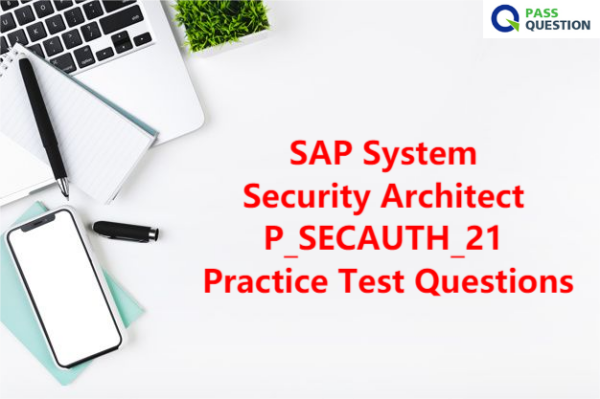SAP P_SECAUTH_21 Practice Test Questions
If you want to clear SAP P_SECAUTH_21 examination on the first attempt, then you can use PassQuestion SAP System Security Architect P_SECAUTH_21 Practice Test Questions and start your preparation today. Our SAP System Security Architect P_SECAUTH_21 Practice Test Questions are one of the best tools that you can use for the preparation of the SAP P_SECAUTH_21 exam. It will help you clear all concepts and you will have to go through our P_SECAUTH_21 Practice Test Questions multiple times to ensure your success in the exam. If you are using these P_SECAUTH_21 questions and answers, then you will be able to clear your concepts so you can do well in the real exam. It will allow you to improve your preparation level so you can easily clear the SAP P_SECAUTH_21 exam.

P_SECAUTH_21 Exam Description - SAP Certified Technology Professional - System Security Architect
The "SAP Certified Technology Professional - System Security Architect" certification exam verifies that the candidate possesses the depth of knowledge required in the areas of SAP System Security and Authorization. This certificate proves that the candidate has an advanced understanding within the Technology Consultant profile and is able to apply these skills practically and provide guidance in SAP project implementations in the role of a SAP Security Architect. Furthermore, the holder of this certification is capable to review and evaluate the security level of complex on-premise, cloud and hybrid system architectures.
P_SECAUTH_21 Exam Details
Exam Name: SAP Certified Technology Professional - System Security Architect
Exam Code: P_SECAUTH_21
Level: Professional
Exam: 80 questions
Cut Score: 66%
Duration: 180 mins
Languages: English
Topic Areas
Authorization Concept for SAP S/4HANA> 12%
Authorization, Security and Scenarios in SAP HANA> 12%
SAP Netweaver Application Server and Infrastructure Security> 12%
Security Monitoring and Security Auditing> 12%
Authorization Concept for SAP Business Suite 8% - 12%
Secure an SAP System 8% - 12%
SAP Cloud Platform Security 8% - 12%
Access Governance and Compliance in SAP< 8%
User Administration and Identity Lifecycle Management in SAP< 8%
View Online SAP System Security Architect P_SECAUTH_21 Free Questions
You want to carry out some preparatory work for executing the SAP Security Optimization Self-service on a customer system. Which of the following steps do you have to execute on the managed systems? Note: There are 2 correct answers to this question.
A.Install the ST-A/PI plug-in
B.Configure Secure Network Communications
C.Configure specific authorizations
D.Grant operating system access
Answer: A, C
What is the SAP Best Practice to delete a security SAP role in SAP landscape?
A.Transport the SAP role and delete the role using Profile Generator
B.Delete the SAP role in all clients using Profile Generator
C.Delete the SAP role using Profile Generator, and then put it in the transport
D.Delete the SAP role in all clients in all systems using Profile Generator
Answer: A
You are consolidating user measurement results and transferring them to SAP. What act on do you take?
A.Run report RSUSR200
B.Run report RFAUDI06_BCE
C.Run report RSLAW_PLUGIN
D.Run transact on USMM
Answer: D
You are running a 3-tier SAP system landscape. Each time you are accessing STMS_IMPORT on any of these systems, you are prompted for a TMSADM password. How can you stop this prompt from appearing?
A.Run the report RSUSR405 on the domain controller.
B.Reset the TMSADM user's password on the system you are trying to access STMS_ IMPORT.
C.Change the TMSA DM user's password directly in the TMS RFC destination in transact on SM59.
D.Run the report TMS_ UPDATE_PWD_OF_TMSADM on the domain controller.
Answer: D
You are setting up your SAP NetWeaver AS in a SSL client scenario. What are the reasons to choose an "anonymous SSL Client PSE" setup?
Note: There are 2 correct answers to this question.
A.To support mutual authentication
B.To support server-side authentication and data encryption
C.To use as a container for the list of CAs that the server trusts
D.To have an individual identity when accessing a specific application
Answer: B, C
Based on your company guidelines you have set the password expiration to 60 days. Unfortunately, there is an RFC user on your SAP system which must not have a password change for 180 days. Which option would you recommend to accomplish such a request?
A.Change profile parameter login/password_expiration_time to 180
B.Create a security policy via SECPOL and assign it to tile RFC users
C.Create additional authorizations for RFC users and assign it to them
D.Create enhancement spot I user-exit
Answer: B
A security consultant has activated a trace via ST01 and is analyzing the authorization error with Return Code 12. What does the Return Code 12 signify?
A.'Objects not contained in User Buffer'
B.'No authorizations and does NOT have authorization object in their buffer'
C.'No authorizations but does have authorization object in their buffer'
D.'Too many parameters for authorization checks'
Answer: B
Comments
Post a Comment